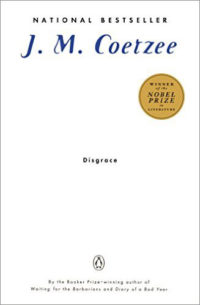Only the monosyllables can still be relied on
 Disgrace
Disgrace
by J M Coetzee
This book has been on my TBR for about 12 years. I knew enough about the subject matter to expect a tough read so I kept on passing over it. It was actually much more readable than I had expected, but that doesn’t negate the difficult subjects covered.
The lead character is David Lurie, a middle-aged university professor in Cape Town whose specialism of modern languages is no longer on the South African syllabus so he teaches communication instead. His is a limp life, teaching without pleasure, amicably divorced, as good as estranged from his daughter. Even his regular trips to a prostitute are without passion.
Indeed, he is impersonal enough with his regular prostitute Soraya that when one day he sees her in a market with her two children, it throws him off balance. He finds he can’t interact with her in the same way any more and she elects to stop seeing him. Here we get the first clue that David is not especially nice or trustworthy, because his reaction to Soraya’s disappearance is to hire a private detective to find her so that he can phone her and disturb her home life.
That’s just chapter one. From there David goes on to have an affair with one of his students, Melanie, a morally troubling affair, and not because of the age gap or university rules. The balance of power is so far askew it’s difficult to read. Their first sex sounds disturbingly close to rape and the second time is actually described as “Not rape, not quite that, but undesired nevertheless, undesired to the core.”
So when Melanie decides to report the affair and David is hauled up on charges of sexual harassment, I am 100% on her side. David is given strong hints that if he is contrite enough he’ll get off lightly. But though he pleads guilty, he is not sorry, and so he is disgraced.
“He sighs. The young in one another’s arms, heedless, engrossed in the sensual music. No country, this, for old men. He seems to be spending a lot of time sighing. Regret: a regrettable note on which to go out.”
That all takes less than 60 pages. The bulk of the story takes place after the disgrace. Will David learn contrition? Will he make amends? From looking at some online reviews, clearly some people think he does but I’m not convinced.
He goes to stay with his daughter Lucy on her smallholding in the Eastern Cape. She’s in her mid-20s, has recently broken up with her long-term girlfriend, but seems happy enough subsistence farming and running a dog kennel service. She is deliberately rejecting the type of life her parents lead (separately) in the city, right down to putting her trust in a black man, Petrus, to help her with the dogs and the farm.
And here we reach the darkest part of the novel: race relations. Until it becomes directly relevant in the second half of the book, no-one’s skin colour has been given, but it’s fairly clear that David is white, Soraya is on her agency’s books as “exotic” and Melanie follows type with “black hair, wide, almost Chinese cheekbones, large, dark eyes”. And it’s undoubtedly race that means David isn’t wholly comfortable with Petrus from the start, though it’s when he learns of Petrus’s ambition to run his own farm, to no longer be a hired hand, that David lets his doubts surface. Lucy is determined to not think like her father, which so soon after the end of Apartheid might be naive.
“ ‘Lucy is our benefactor,’ says Petrus; and then, to Lucy: ‘You are our benefactor.’
A distasteful word, it seems to him, double-edged, souring the moment. Yet can Petrus be blamed? The language he draws on with such aplomb is, if he only knew it, tired, friable, eaten from the inside as if by termites. Only the monosyllables can still be relied on, and not even all of them.”
This is a very troubling, uncomfortable book. In its short span it can’t get into every nuance of racial politics in late-1990s South Africa, but the picture it does paint is not pretty. There is violence, poverty and the weight of history behind much of what is said and unsaid.
I did not warm to David even when he turns out to have a soft spot for animals, because he never sees what he is: selfish to the core. Lucy tries to get through to him, pointing out that she is not just a character in his story, but the lead in her own story, but David never really gets it, he’s so busy being certain that he is right.
For all its disturbing content and prickly characters, this is a beautifully written, engaging read. I rarely read this quickly without empathising with at least someone, which I think says a lot for Coetzee’s skill. It has great depth and I keep thinking about the hidden possibilities behind the events. However, I didn’t love it.
Published 1999 by Martin Secker & Warburg.
Winner of the 1999 Booker Prize.
Source: Given to me by a friend.